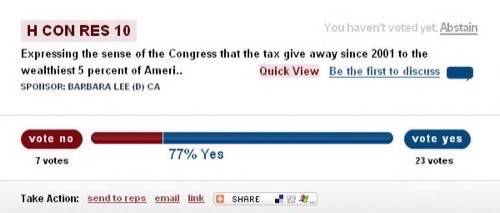The knock on the type of representative democracy that is employed in the US is that the people aren’t actually voting on the legislation that gets passed — representatives for the people are doing it for them. And those representatives are potentially beholden to outside influences like political action committees and lobbyists who help them raise money necessary to get elected. The system is supposed to weed out the bad eggs via regular elections (if your rep isn’t representing you, don’t vote for he or she next time around), but maybe that’s not good enough. Enter Govit, a site that lets citizens weigh in on bills currently being voted on in the US House and Senate.

Govit lists every piece of active legislation currently before the United States Congress and lets users vote yes/no or abstain on each. From the voting page for each bill, users can also send a message directly to their government representatives urging them to vote a specific way, or send a message to their friends doing the same. Govit can also compare your votes to those of your representatives, those of Congress at large, and to the rest of Govit.
Govit acts something like a social network for politics. Each member of the House or Senate gets their own profile on the site that has a bio, fundraising information, and voting record, as well as how that member of Congress stacks up against Govit — do their votes match the will of the people? Users can rate Congressional members, comment on them, and say whether or not they would vote for them.

On a more personal level, Govit allows members to befriend each other, which basically just lets you to compare your voting record to that of your friends if you have your profile set to public view. Unfortunately, by setting Govit up as a social network, the site becomes sort of a microcosm view of the American political system at large — or at least it has the potential to. If we pretend that Govit becomes popular enough to actually have a national impact (i.e., politicians actually start paying attention to it), because it is set up in a manner where people are encouraged to shill for votes, it is easy to imagine the same back room dealing that goes on in Washington taking place on the site.
It’s hard to look at Govit as the true “will of the people” because users have the option to make their votes public — thus creating the potential for groupthink. Perhaps that is the will of the people anyway, but it would be easier to trust Govit’s numbers if users at least didn’t know who was voting which way until after the final ballot was cast. In other words: secret ballots tend to yield better results.
Still, Govit provites a useful tool for keeping track of what Congress is talking about, discussing it with like-minded folks, and seeing how your representatives match up with your own views. If you and your congressman are consistently voting on opposite ends of the spectrum, you might think twice about voting for he or she next term.

















